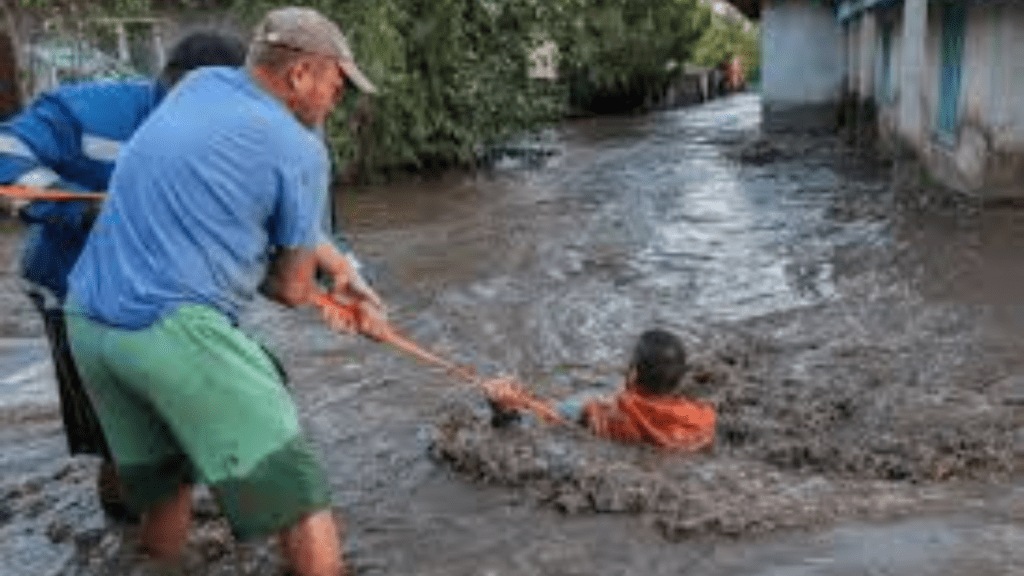Central Europe is reeling from some of the worst flooding in two decades, with rising river levels inundating communities and increasing the death toll across the region. The severe weather has led to significant damage and widespread evacuations, prompting both immediate relief efforts and a closer look at the mounting costs. At least 15 people have died in flooding from Austria to Romania.
Heavy rainfall over the past week has caused rivers to burst their banks, with border areas between the Czech Republic and Poland particularly hard-hit. The surge in water levels resulted in the collapse of several bridges, forced numerous evacuations and left behind extensive destruction.
Michal Piszko, mayor of Klodzko, a town on the Polish-Czech border, said waters had receded there but help was needed. “We need bottled water and dry provisions, because we have also set up a point for flood victims evacuated from flooded areas,” he added. Meanwhile, Polish Education Minister Barbara Nowacka said that around 420 schools across four provinces had been closed. In the town of Nysa a hospital was evacuated. “Children will not go to school until the end of the week. At the moment, half of the city has no electricity,” he stated.
In the Czech town of Jesenik, where floodwaters surged through on Sunday, residents are beginning the cleanup process. Damaged vehicles and debris are scattered throughout the streets, revealing the extent of the destruction.
In eastern Romania, the situation is similarly dire. Emil Dragomir, the mayor of Slobozia Conachi, described the aftermath as heart-wrenching. “If you were here, you would cry instantly,” Dragomir told Digi24. “People are desperate, having lost everything they worked for. Many have been left with only the clothes on their backs.”
As the floodwaters continue to recede, efforts to provide relief and assess the full impact of the disaster are ongoing. More than 12,000 people have been evacuated across the Czech Republic. While the number of households without power initially rose to a quarter of a million over the weekend, it had decreased to 118,000 by Monday, according to CTK news agency.
In the Czech Republic, the rising Morava River has caused severe flooding in Litovel, a city about 230 kilometres east of Prague with nearly 10,000 residents. The flooding has also affected northeastern Czech regional capital Ostrava, where the inundation forced the shutdown of a power plant and two chemical plants.
It has resulted in fatalities across the region. In Romania, six people lost their lives over the weekend, and an Austrian firefighter was reported dead on Sunday. In Lower Austria, two men, aged 70 and 80, were found drowned in their homes. In Poland, five deaths have been confirmed, and one person has died in the Czech Republic, according to state news agency PAP and local police reports.
Hungary and Slovakia on high alert
Hungary is on high alert as floodwaters continue to challenge the region, with the Danube River and its tributaries posing a significant risk. Hungarian Interior Minister Sandor Pinter assured that the government in Budapest is well-prepared to manage the crisis. “Our focus is on keeping the Danube and its tributaries within their banks,” Pinter stated.
To bolster response efforts, up to 12,000 soldiers are on standby to assist if necessary.
Both Bratislava, the capital of Slovakia, and Budapest, the Hungarian capital, are bracing for potential flooding as the Danube River levels continue to rise. The situation remains critical as authorities closely monitor the river’s behaviour.
In Austria, while river and reservoir levels have decreased overnight due to a respite in rainfall, officials are not easing their vigilance. They are preparing for a possible second wave of flooding, as forecasts predict heavier rain in the coming hours.
(with inputs from Reuters)


